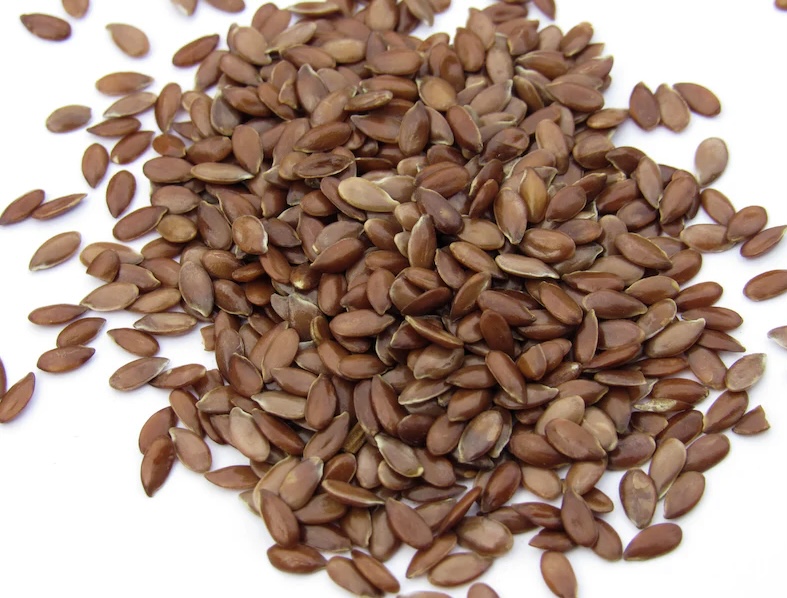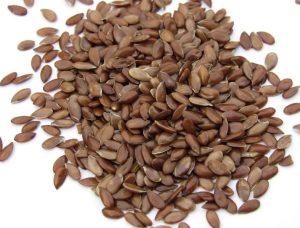
Flaxseed can benefit healthy aging.
Genes certainly play a role in health as people age.
After all, it is hard to fool the gene pool!
Choices also impact the aging process.
Kind of an extension of that "nature or nurture" thing.
People with great genes can increase their risk of ailments through poor diet and exercise.
Those who have poor genes can improve their health through lifestyle changes.
According to a recent Livestrong article titled “Want to Age Well? Add a Spoon of This to Your Daily Diet,” some foods are more nutrient rich than others.

Ground flaxseed has better health benefits than whole flaxseed.
Simply choosing to include more of these beneficial foods in your diet can have a positive impact on your organs and body systems.
Nuts and seeds fall into this category.
The USDA 2020-2025 Dietary Guidelines for Americans recommends senior adults consume four to five servings of seeds and nuts weekly.
Specifically, flaxseed is easy to incorporate into daily diet and is also quite healthy.
A single serving is typically between one and two tablespoons.
Although flaxseed can be consumed whole, it is better to have ground flaxseed.
Why?
According to the National Library of Medicine (NLM), the ground seeds are simpler to digest, making it easier for you body to absorb the nutrients.
What are the health benefits for flaxseed?
Nutrients for Disease Prevention.
Most people in America eat diets high in calories, fat, sugar, and sodium.
This is especially true during the holiday season just ended, yes?
According to a Missouri Medicine research report from November 2020, these factors are linked to an increased risk of obesity and chronic illness.
Additionally, fast foods and highly processed foods are not very nutrient rich and may lead to lower levels of important vitamins and minerals while also increasing inflammation in the body.
[Translation: even though that "plumper" hotdog at the Royals game may be tasty, a steady diet of the same may not be a great idea.]
The antioxidants and other nutrients found in flaxseed can neutralize free radicals.
As a result, there is a reduction in cell damage and in the risk of associated health problems.
Nutrients for Heart and Brain Health.
Flaxseeds have high concentrations of omega-3 fatty acids.
The three main types of omega-3 fatty acids are eicosapentaenoic acid (EPA), docosahexaenoic acid (DHA), and alpha-linolenic acid (ALA).
The fatty acid found in flaxseed is ALA.
ALA can be converted by the body into DHA and EPA.
Omega-3 fatty acids are linked to reduced risk of heart disease, heart problems, and deaths related to the heart.
Flaxseed also has lignans.
According to the America Heart Association, lignans are associated with lowering blood pressure and cholesterol.
Nutrients for Muscle Health.
Muscle tone is key to strength and functioning.
People tend to lose muscle mass as they age.
This muscle atrophy is known sarcopenia and can lead to weakness and diminished balance.
Exercising and consuming protein-rich diets can help counter some of the natural muscle loss.
For seniors to preserve or increase muscle mass, the amount of protein in their diet will need to be increased.
Flaxseed is an excellent source or protein.
Two tablespoons of flaxseed contain 2.6 grams of protein.
This is nearly 6 percent of the daily recommended value.
Flaxseed can be easily added into meals by mixing it into oatmeal, cereal, smoothies, salads, and sauces.
In short, flaxseed is nothing short of a natural health supplement wonder you can easily incorporate into your diet.
Reference: Livestrong (Sep. 26, 2022) “Want to Age Well? Add a Spoon of This to Your Daily Diet”
REMEMBER: “The choice of a lawyer is an important decision and should not be based solely upon advertisements.”
This statement is required by rule of the Supreme Court of Missouri.
